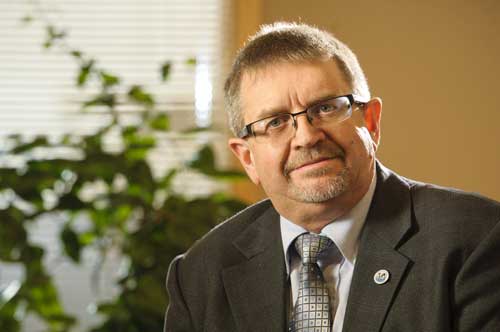As much as David Hill describes his return to Lethbridge as a homecoming, he is quick to recognize that what he thought he knew about the University of Lethbridge only scratched the surface.
"I always thought I was pretty familiar with what was happening at the University, and I have been pleasantly surprised by both the depth and breadth of the intellect, experience and opportunity that exists," says Hill, the new director of centres and institutes and research advocacy.
Since assuming his post Sept. 1, Hill has seen the introduction of the ninth research centre/institute on campus (Institute for Child and Youth Studies), the declaration by RE$EARCH Infosource that the U of L is Canada's Research University of the Year (2012 Undergraduate category) and the highest ever ranking from Maclean's magazine.

"This really is a career opportunity," says Hill. "From my personal perspective, this allows me to make a difference, to use all the skills I've developed over my career and to do it in a way that will add value to the research and the teaching that's happening here."
Born in Eastern Canada, Hill spent much of his youth in Europe before eventually settling in the Lethbridge area. He married his wife Betty, a Picture Butte native, in 1974, and they spent the early days of their marriage in towns such as Taber, Vauxhall and Brooks, all the while raising five children.
Professionally, Hill became well known both provincially and nationally as a key advocate for water research, water use policies and irrigation management. In the six years prior to coming to the U of L, Hill was the executive director of Water Resources for Alberta Innovates-Energy and Environment Solutions, based in Edmonton.
The key contacts he has established over the years will serve him well in his new capacity at the U of L.
"I think what I bring to this is the ability to take some of the research findings and outcomes happening in the various centres and institutes and get them into communities of interest that would not normally have contact with the researchers," says Hill.
And it's not just about water, although Hill is cognizant of the long history he was with the University's water researchers.
"There is so much that is happening within all the centres and I've found, particularly when I'm visiting labs and talking with students, that the level of commitment and excitement is so high, I'm going to have a difficult time deciding where to invest my time," he says.
Hill is a big proponent of the centres and institutes approach the U of L has taken in establishing areas of expertise. By investing strategically in people and infrastructure, the University has been able to focus on its core strengths while invigorating interdisciplinary research.
"They have, in many respects, been a means of bringing researchers with common interests together to share their talents and expertise in ways that weren't formerly done," he says.
"We all need to challenge ourselves somewhat about what we know and where we know it from. We're living in a world now that is talking an awful lot about collaboration, but it really does spawn ideas through that dialogue and interaction that individuals on their own would likely not come to. That's one of the key advantages of these centres and institutes, to discover new ideas together."
This discovery benefits all, not the least of which are U of L students.
"At the end of the day, universities still educate and that student experience, in an area where there is such a rich exchange of ideas, I think is really valuable."
GET THE FACTS
· Hill loves going to bat for a 'smaller' university like the U of L, saying, "We have a very unique ability to involve undergraduates and graduates in key research interests that are pressing needs for society. That's the part around research advocacy that I'm going to find really enjoyable and interesting."
· Hill's son, Justin (BSc '08), is the GIS co-ordinator for Palliser Regional Municipal Services Ltd.
· His daughter, Jennifer, works with Alberta Innovates Technology Futures in the Alberta Genetically Engineered Machines program, and she is now running the Imagine Cup competition, while another daughter, Jocelyn, works in the U of L Daycare
· Hill loves to cook to relieve stress, citing all kinds of chili as a favourite dish to prepare
This story first appeared in the December 2012 issue of the Legend. For a look at the full issue in a flipbook format, follow this link.
